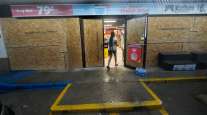Louisiana's Next Debate on a Higher Gas Tax? Likely 2021, at the Earliest

The death of the push to raise Louisiana's gasoline tax not only ended the issue for 2017.
It likely killed any chance for such an increase in 2018, 2019 and 2020 as well.
A combination of legislative rules and politics means 2021 is probably the earliest the issue will reappear, barring a major surprise.
The topic sparked debate during the just-ended regular session because it was a fiscal session, which means lawmakers can debate tax hikes.
But 2018 will be a nonfiscal session, and while 2019 will be a fiscal session, it is also the year for gubernatorial elections, which means major tax increases are unlikely.
"If we don't have the courage to do it now, we won't have the courage to do it in an election year," House Transportation Committee Chairman Kenny Havard said June 12.
Another nonfiscal session is set for 2020.
A bill to raise the gas tax by up to 17 cents per gallon — $510 million per year — died in the House because backers were unable to round up the needed two-thirds majority for approval.
The state has a $13.1 billion backlog of road and bridge projects, and a task force named by Gov. John Bel Edwards in December recommended that the state spend another $700 million per year for roads, bridges and other transportation services.
Opponents said the time was wrong for a gas tax hike, especially with lawmakers grappling for answers to Louisiana's latest budget crisis.
Motorists pay 38.4 cents per gallon now, including 20 cents per gallon in state charges.
Shawn Wilson, secretary for the state Department of Transportation and Development, co-chaired the task force and helped lead the effort for a gas tax boost. "Conventional wisdom says we are out of the window of opportunity," Wilson said June 12.
However, Wilson said there may be a chance to address the issue when lawmakers return for another special session later this year or early next year on longstanding revenue shortages.
He said President Donald Trump's plan to improve infrastructure nationwide could be an impetus to revisit the issue. "If we want to be competitive we will need a new revenue source," Wilson said of any federal road and bridge building effort.
Officials of the groups behind the push this time often mentioned that 2017 was the last, realistic chance to address the issue for the foreseeable future.
A 35-member organization, including the Baton Rouge Area Chamber, took the unusual step of endorsing a $500 million increase in state transportation spending.
In a statement, BRAC called last month's demise of the gas tax bill a "massive missed opportunity."
"By not securing additional funding to begin addressing crumbling infrastructure, it is unlikely to expect any assistance from the state until 2021 at the earliest," Adam Knapp, president and CEO of the group, said in a statement.
Building a new bridge across the Mississippi River in Baton Rouge is the key priority of BRAC and other local leaders.
"And as we told the Capital Region legislators, it is a decade to plan and build a bridge," Knapp said in an interview June 12. That means a new bridge is likely at least 15 years away compared to 8-10 years if new aid had been approved this year, he said.
Havard has repeatedly urged colleagues to tackle transportation problems in a package that addresses higher education and other state needs. But he said the lack of legislative action on the issue of roads and bridges this year will carry consequences for motorists.
"Our traffic is only going to get worse," Havard said. "It is a quality of life issue we have to address."
Wilson said his immediate concern is being able to come up with enough state dollars to draw down the state's maximum federal aid.
He said in February that the lack of dollars could cost the state up to $450 million in federal dollars starting next year.
Louisiana typically gets between $650 million and $700 million per year in federal transportation aid.
Knapp said the push to boost the gas tax died in part because of a lack of legislative support in areas with high-profile transportation issues, like a new bridge on Interstate 10 in Lake Charles and the development of I-49 South in Acadiana.
He said the lack of new state aid for roads and bridges will make it "much, much harder" to convince manufacturers to expand.
"I can definitely say it has cost the Baton Rouge area projects," Knapp said.
Distributed by Tribune Content Agency, LLC




